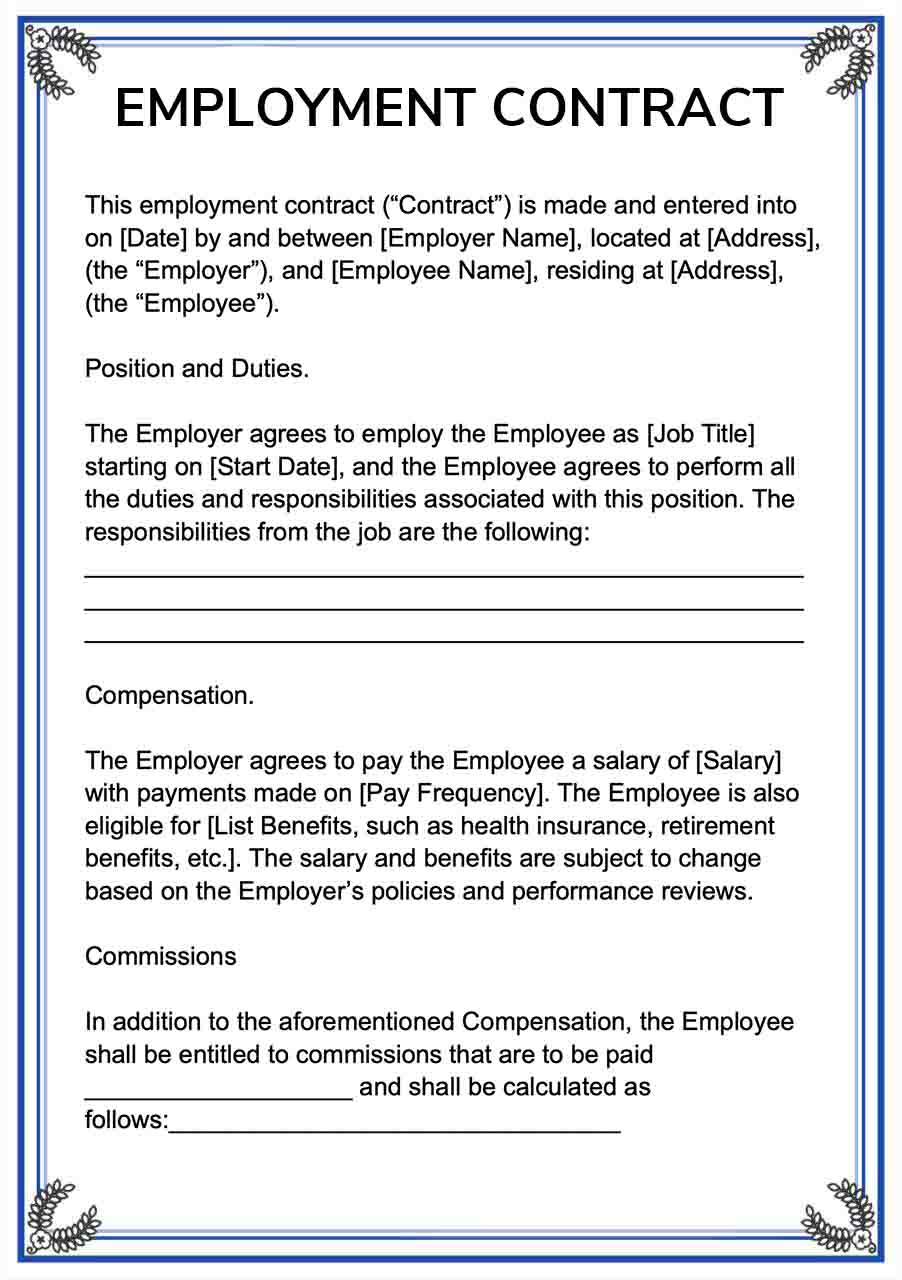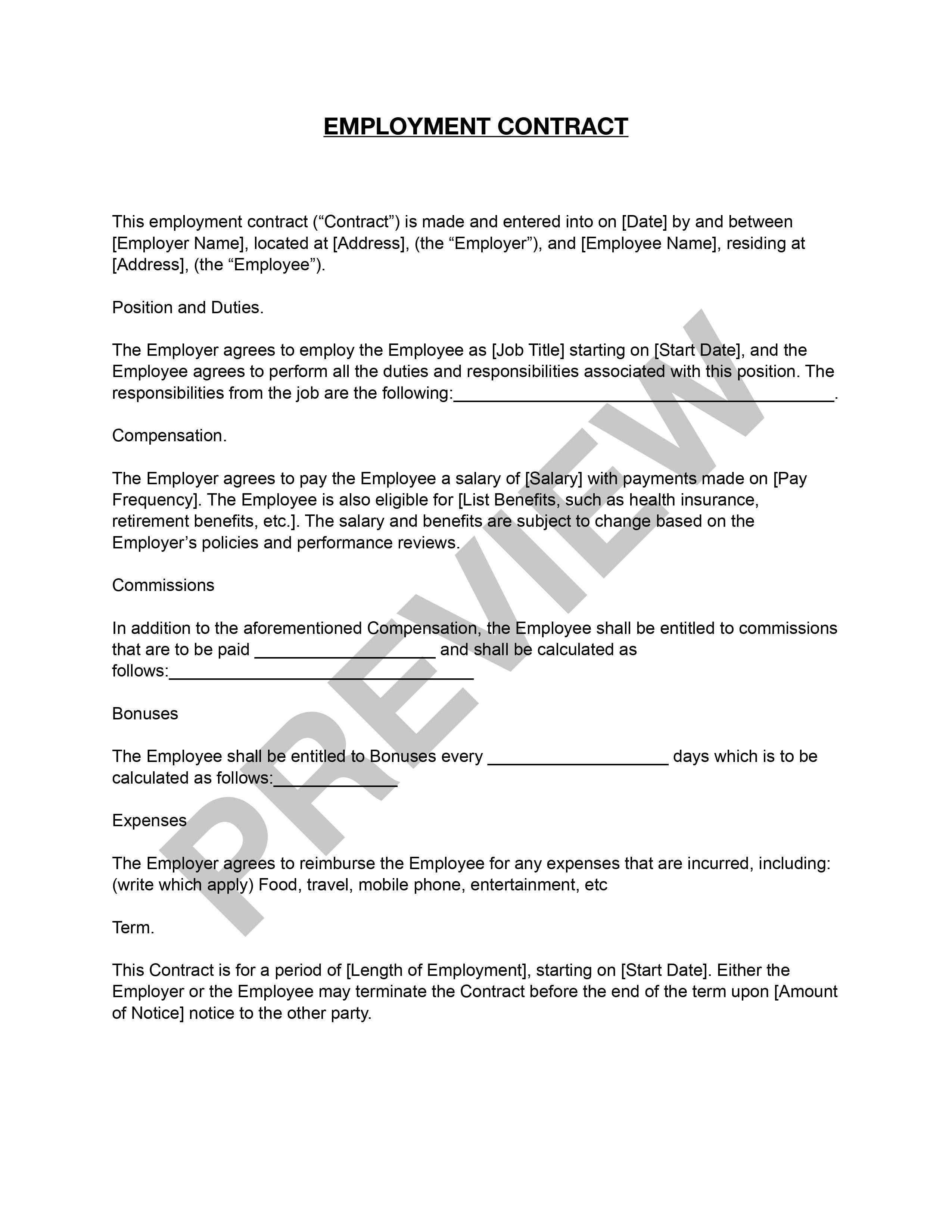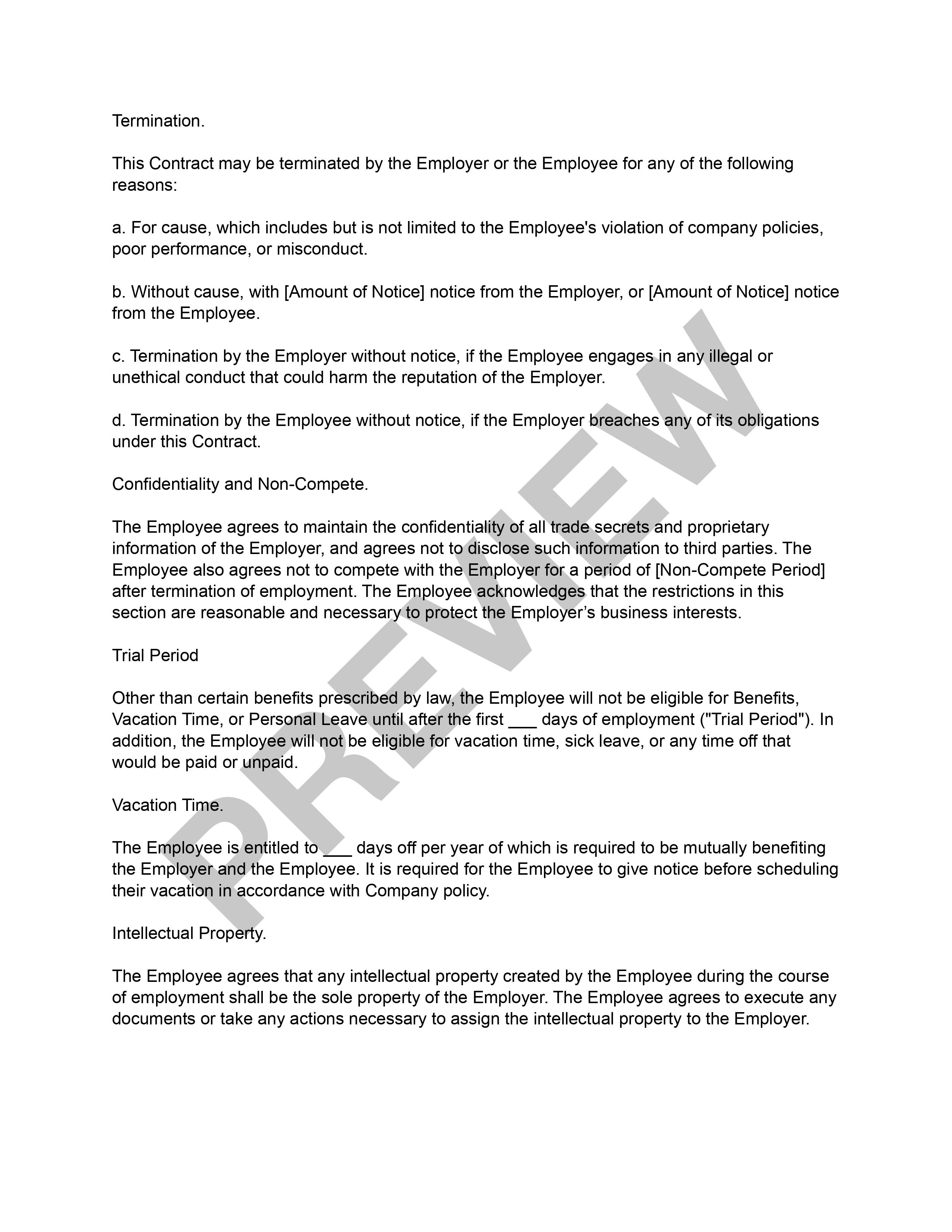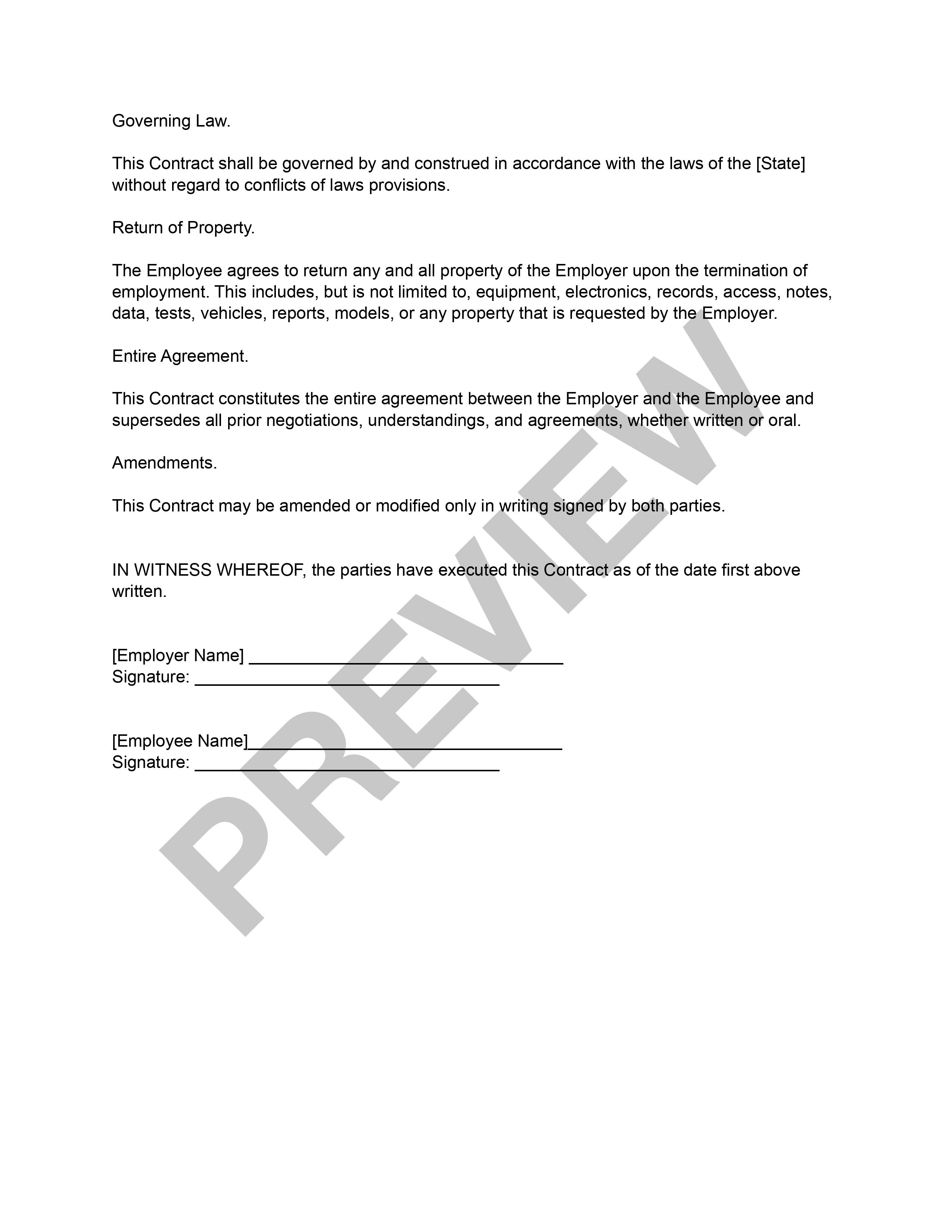Generate Employment Contract
An employment contract is a formal agreement between an employer and employee that outlines the terms and conditions of their employment. It includes information such as job duties, compensation, and termination policies.
Last Updated May 2023
What is an Employment Contract?
An employment contract is a formal and legally binding agreement between an employer and an employee. The purpose of the contract is to outline the terms and conditions of the employment relationship, including the job duties, compensation, benefits, working hours, and termination policies. It is intended to provide both parties with a clear understanding of their respective rights and obligations.
Employment contracts are typically used by employers to establish and maintain a positive working relationship with their employees. They can help to prevent misunderstandings or disputes by clearly outlining the expectations of both parties. For example, an employment contract may specify the job duties and responsibilities of the employee, along with any performance expectations or metrics that they will be evaluated on.
Who needs an Employment Contract?
Both employers and employees need an employment contract.
For employers, an employment contract is a useful tool for establishing and maintaining a positive and productive working relationship with their employees. By outlining the terms and conditions of employment, an employment contract can help to prevent misunderstandings or disputes and protect the interests of the employer. Additionally, some jurisdictions require employers to provide written employment contracts to their employees in certain circumstances.
For employees, an employment contract is a valuable tool for understanding their rights and obligations in the workplace. It can help to ensure that they are fairly compensated, provided with the benefits they are entitled to, and treated fairly in the event of termination. It can also help employees to negotiate more favorable terms of employment before accepting a job offer.
What should I include in my Employment Contract?
Here are some key elements that should be included in an employment contract:
-
Job Title and Description: Clearly define the employee's job title and duties to avoid confusion or misunderstandings.
-
Compensation and Benefits: Specify the employee's salary or wage, any bonuses, commission or other compensation, and the benefits that the employee is entitled to receive (such as health insurance, retirement plans, etc.).
-
Work Schedule: Define the employee's work schedule, including the days and hours they are expected to work, and any overtime policies or pay rates.
-
Employment Status: Specify whether the employee is a full-time, part-time, or temporary employee, and whether they are an "at-will" employee or have a specific term of employment.
-
Termination: Outline the circumstances under which the employee may be terminated, including any notice requirements, and the consequences of termination (e.g. severance pay, return of company property, etc.).
-
Confidentiality and Non-Disclosure: Include clauses that protect the employer's confidential information and trade secrets, and prohibit the employee from disclosing such information to others.
-
Non-Compete and Non-Solicitation: Consider including clauses that restrict the employee from working for a competitor or soliciting the employer's clients or customers after leaving the job.
-
Intellectual Property: Define the ownership of any intellectual property created by the employee during their employment, and specify any rights the employer may have to use or license such property.
-
Dispute Resolution: Include a clause that outlines the process for resolving any disputes that may arise between the employer and employee.
These are just a few of the key elements that should be included in an employment contract. It is important to tailor the contract to the specific needs of the employer and employee, and to seek legal advice to ensure that it complies with relevant laws and regulations.
Are there any legal requirements or restrictions on the contents of an employment contract?
Yes, there are legal requirements and restrictions on the contents of an employment contract. These requirements and restrictions vary by jurisdiction, but some examples include:
-
Minimum wage: Employers must pay their employees at least the minimum wage set by federal, state, or local law. An employment contract cannot provide for a wage that is lower than the minimum wage.
-
Overtime pay: Employers must pay non-exempt employees overtime pay for hours worked over a certain number of hours per week, as required by federal or state law.
-
Non-discrimination: Employers cannot discriminate against employees on the basis of protected characteristics, such as race, gender, age, religion, or disability. An employment contract cannot provide for discriminatory treatment of employees.
-
Family and medical leave: Employers may be required to provide employees with family and medical leave under federal or state law. An employment contract cannot waive an employee's rights to such leave.
-
Workers compensation: Employers may be required to provide workers' compensation insurance to employees who are injured on the job. An employment contract cannot waive an employee's right to file a workers' compensation claim.
-
Privacy: Employers must comply with privacy laws that govern the collection and use of employee personal information. An employment contract cannot violate an employee's privacy rights.
-
Restrictive covenants: Some jurisdictions place limits on the use of non-compete, non-solicitation, or other restrictive covenants in employment contracts. Employers must ensure that these provisions comply with applicable laws.
These are just a few examples of the legal requirements and restrictions that may apply to the contents of an employment contract. It is important to consult with a lawyer to ensure that the contract complies with relevant laws and regulations.
Frequently Asked Questions
Yes, an employment contract can be modified after it has been signed, but only with the agreement of both the employer and the employee. Any modifications to the contract should be made in writing and signed by both parties.
It is important to note that some employment contracts may contain a clause that specifies how and when the contract can be modified. For example, the contract may require that any modifications be made in writing and signed by both parties, or it may specify that modifications can only be made with the approval of a certain individual or group within the company. Employers should ensure that they follow any such requirements when modifying an employment contract.
If an employee breaches the terms of an employment contract, the consequences will depend on the specific provisions outlined in the contract and applicable laws. Here are some general possibilities:
- Disciplinary Actions: The employer may choose to take disciplinary actions as outlined in the employment contract or company policies. This can include verbal or written warnings, suspension, or other forms of disciplinary measures. The severity of the breach and the employer's policies will determine the appropriate action.
- Termination of Employment: In more serious cases, the employer may choose to terminate the employee's employment for breaching the contract. Termination can occur immediately or after providing the employee with a notice period, depending on the nature of the breach and any legal requirements.
- Legal Consequences: In certain situations, the employer may take legal action against the employee for breaching the contract. This could involve seeking damages or injunctive relief through litigation or alternative dispute resolution methods. It is essential to consult with legal counsel to determine the appropriate legal recourse.
It's important to note that the consequences for breaching an employment contract should be proportionate to the violation and consistent with applicable laws and regulations. Employers should adhere to fair employment practices, follow any contractual procedures, and consult with legal professionals to ensure compliance with employment laws in their jurisdiction.
If an employer breaches the terms of an employment contract, the consequences can vary depending on the nature of the breach and the applicable laws and regulations. Here are some possible outcomes:
- Legal Remedies: The employee may have the right to pursue legal remedies for the breach. This can include filing a lawsuit seeking damages for any losses suffered as a result of the breach. The employee may also seek specific performance, which is a court order requiring the employer to fulfill its obligations under the contract.
- Contractual Remedies: The employment contract itself may outline specific remedies in the event of an employer breach. This could include provisions for dispute resolution, arbitration, or mediation. The contract may specify the steps to be taken or the compensation to be provided in case of a breach.
- Termination or Resignation: If the breach is significant and the employment relationship becomes untenable, the employee may choose to terminate the contract and resign from their position. In some cases, the contract may include provisions for termination in the event of an employer breach, such as allowing the employee to terminate the contract with notice or without penalty.
- Damages and Compensation: If the breach results in financial losses for the employee, they may be entitled to seek compensation or damages to recover those losses. This could include lost wages, benefits, or other monetary damages incurred due to the employer's breach.
It's important for employees to consult with legal professionals and review the specific terms of their employment contract to understand their rights and options in the event of an employer breach. Employment laws can vary by jurisdiction, so it's crucial to consider the applicable laws and regulations that govern employment relationships.
What happens to employee benefits upon termination can depend on various factors, including the terms of the employment contract, company policies, and applicable laws. Here are some common scenarios:
- Severance Pay: In some cases, when an employee is terminated, they may be entitled to receive severance pay. Severance pay is typically provided as a form of financial compensation to employees who are involuntarily terminated, and the amount and eligibility criteria can vary based on factors such as length of service, position, or company policy.
- Notice Period: Depending on the jurisdiction and employment contract, employers may be required to provide employees with a notice period before termination. During this notice period, the employee typically continues to receive their regular compensation and benefits.
- Continuation of Benefits: In certain situations, employers may offer the option for terminated employees to continue their healthcare, dental, or other insurance benefits under the company's group plan through COBRA (Consolidated Omnibus Budget Reconciliation Act) or similar regulations. The employee may be responsible for paying the full cost of the premiums.
- Payout of Accrued Benefits: Employees may be entitled to receive a payout for any accrued but unused benefits, such as unused vacation or paid time off. The specific rules regarding the payout of accrued benefits can vary by jurisdiction and company policy.
- Retirement and Pension Plans: If the employee participates in a retirement or pension plan, the treatment of those benefits upon termination can depend on the specific plan rules and applicable laws. Some plans may allow the employee to retain their accrued benefits or provide options for transferring or rolling over the funds.
It is important for both employers and employees to consult with legal professionals, review the terms of the employment contract, and understand the applicable laws to determine the specific rights and obligations regarding employee benefits upon termination.
Restrictions on working for a competitor after leaving a job are typically addressed through non-compete agreements or clauses within an employment contract. The enforceability and extent of these restrictions can vary by jurisdiction, so it is important to consider local laws and regulations. Here are some key points to understand:
- Non-compete Agreements: A non-compete agreement is a contractual provision that restricts an employee from working for a competitor or engaging in a similar business activity for a specified period of time and within a specific geographic area. These agreements are designed to protect a company's trade secrets, confidential information, customer relationships, or other legitimate business interests. However, the enforceability of non-compete agreements varies widely and may be subject to legal scrutiny in some jurisdictions.
- Reasonableness and Scope: To be enforceable, non-compete agreements must generally be reasonable in terms of duration, geographic area, and scope of activity. The restrictions should be narrowly tailored to protect the legitimate business interests of the employer without unduly limiting the employee's ability to find alternative employment.
- Consideration: For a non-compete agreement to be valid, it typically requires adequate consideration, such as a job offer, promotion, or other benefit given to the employee in exchange for agreeing to the restriction. In some jurisdictions, continued employment alone may not be sufficient consideration.
- Legal Restrictions: Some jurisdictions have specific laws or regulations that limit the enforceability of non-compete agreements. For example, some states in the United States may prohibit or restrict non-compete agreements in certain industries or for certain types of employees.
- Consultation with Legal Professionals: Both employers and employees should consult with legal professionals to understand the specific laws and regulations regarding non-compete agreements in their jurisdiction. Legal advice can help determine the enforceability of such agreements and the potential consequences of breaching them.
It's important to note that non-compete agreements are highly dependent on local laws and the specific terms within the employment contract. Therefore, it is crucial to seek legal counsel to review and provide guidance on the enforceability and implications of any non-compete restrictions.



